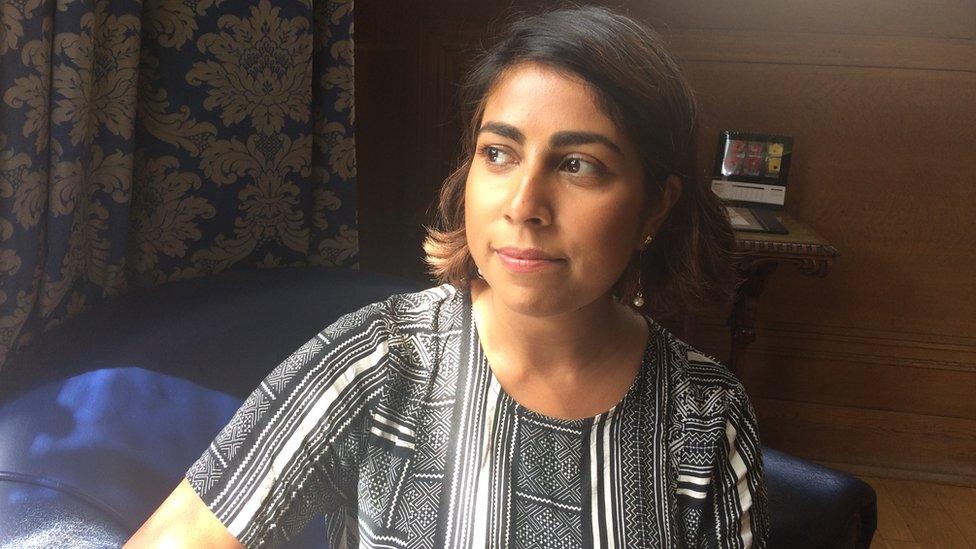Why are there so few female engineers?
- Published

The UK needs to produce thousands more engineers
Fewer than one in 10 engineers in the UK is female - the lowest percentage in Europe, according to the Women's Engineering Society. Latvia, Bulgaria and Cyprus lead with nearly 30%. Here, two pioneering female engineers at Oxford University explain what drives them.

Priyanka Dhopade was named as one of the top 50 Women in Engineering Under 35 in 2017, as chosen by the Women's Engineering Society. She grew up in Canada, where she studied for a degree in aerospace engineering. She completed a PhD at UNSW Canberra in Australia, before moving to Oxford in 2013.

Priyanka Dhopade at St John's College, Oxford
As a child I was very interested in aeroplanes, and how things fly in space - I wanted to be an astronaut. My parents suggested engineering, because it's quite practical. I could use my enthusiasm and my skills to do something that's real that matters.
Environmental goals
My research looks at the thermodynamics and the fluid dynamics of jet engine internal flows. I do a lot of computational fluid dynamics to look at the transfer of heat inside an engine and use those predictions to help design innovative cooling systems for modern jet engines. What that does is it helps to make the engine more efficient and safer as well, and reduces the environmental impact in terms of emissions and fuel consumption. If we help to make jet engines more efficient, that's going to have a huge environmental impact.
Not just hard hats
The stereotype of an academic is someone who sits at their desk and doesn't talk to anybody and just scribbles away in their notebook. But I talk to so many experimentalists and work with them to help design these massive test facilities so that we can look at different aspects of the jet engine. I work with industry sponsors and get their input on the real problems that they are facing. I spend some time on the computer as well. I think that's also another thing that people don't realise, that in our modern digital world - engineering, a lot of it, is computer-based. It's not about wearing a hard hat and being on-site - although those roles are still available for those who are attracted to them.
Rewarding career
I try not to think about it on a daily basis because I'm quite busy and I'm doing interesting things, but, occasionally, I look around and see that I'm the only woman in the room full of 30 or 40 men and I do find it a bit odd. The cultural, historical connotations of engineering, particularly in Britain, seem to be quite different from other countries, certainly in the culture that I grew up in, which is South Asian. The connotation of an engineering career is something quite prestigious, and boys and girls are encouraged to do it, because it's seen as a stable, rewarding career, financially as well. So I find it a bit odd coming to Britain and seeing that people aren't as enthusiastic - it's not as prestigious or as respected a profession. And, not seeing enough women doing it - it breaks my heart.
Encouraging women
I think there's so many problems that need to be solved and the problems are quite diverse, so the solutions also need to be diverse. We need to be involving as many different members of society as possible, not just women but also different ethnicities and different socioeconomic classes and disabilities - it has to be a combined effort. Making parents and teachers aware that engineering is an interesting, rewarding, successful career choice for girls would go a long way towards increasing the intake of girls. But, at the same time, we have to do things to improve the environment for when they do become engineers.
Role models
My earliest role model was my dad, who was a mechanical engineer. Growing up I didn't really have any other engineering role models but when I became a graduate student and started to feel more and more that I was a minority in terms of gender, I started to seek out role models. Now I know all of these amazing female engineers who are definitely huge role models to me, like Dame Ann Dowling, Professor Eleanor Stride at Oxford and Professor Alison Nobel at Oxford. I think they don't get as much visibility as they deserve. For young girls to look up to someone like Dame Ann Dowling and say, 'I want to be like her' - that would make such a huge difference.

Gladys Ngetich grew up in Kenya, where she studied engineering. She came to Oxford as a Rhodes Scholar, and is now studying for her PhD.

Gladys Ngetich outside her lab in Oxford
My father was an engineer in Kenya. During holidays he would come home with spanners and engineering tools trying to fix things here and there. I think I was introduced to that engineering environment when I was very young.
Aerospace dreams
I'm looking at improving or coming up with new efficient advanced cooling technologies for jet engines. We are filing a patent. That's actually one of my dreams. To work and to come up with something which is significant, that is going to have uses in the world in terms of making intercontinental travel safe and efficient so we use less fuel, we have less emissions, and just generally helping people all over the world.
Filing a patent
Aerospace is male-dominated. Personally, it's not been a big problem for me because I was born after four boys and so most of my childhood I spent with boys. I've had role models all through my levels of education - grammar school, high school, undergrad and now in Oxford. I think my biggest role model is my supervisor. He's helped me to write a paper and file a patent. I feel I have already achieved more than I was expecting. In five years, I'm not sure where I will be, but it will either be industry, maybe in Oxford, or I will be teaching.
Follow Helen on Twitter, external.